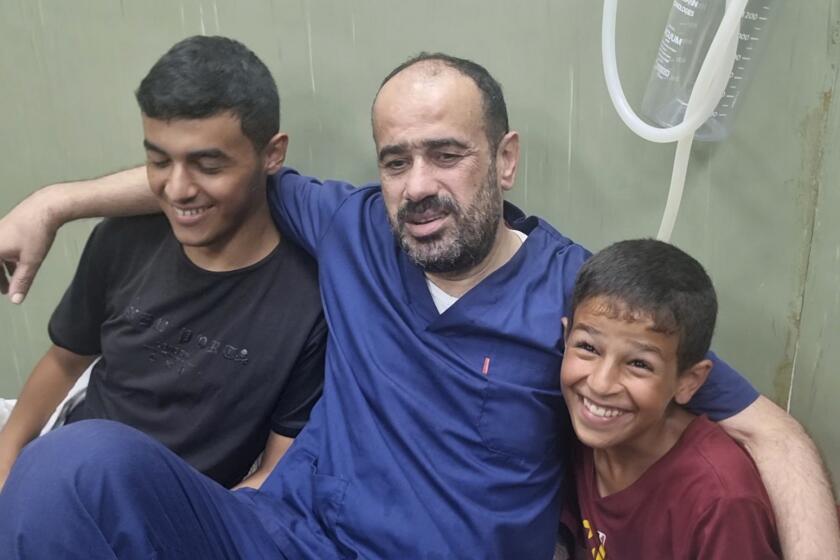Mexico drug kingpin slain in fierce gun battle with military
The Mexican drug kingpin known as “Tony Tormenta,” a top leader of the powerful Gulf cartel, was killed Friday in a ferocious gun battle with military forces in the northern border state that had long been his tightly controlled home turf.
Antonio Ezequiel Cardenas Guillen, alias Tony Tormenta or Tony the Storm, was killed along with three of his henchmen after hours of battle in the city of Matamoros, in Tamaulipas state just across the border from Brownsville, Texas, the Mexican government announced.
Two members of the Mexican navy’s special forces were also killed, as was a Mexican reporter. It was unclear whether other civilians died.
Cardenas, 48, had acted as one of two top commanders of the Gulf cartel after his brother, Osiel, longtime leader of the group, was captured in 2003 and extradited to the United States, where he was sentenced to 25 years in U.S. prison in February and ordered to forfeit $50 million in assets.
The U.S. Drug Enforcement Administration had offered a reward of up to $5 million for Cardenas’ capture and is believed to have provided intelligence to Mexican authorities in the pursuit of the drug lord.
The death of Cardenas will be seen as an important victory for beleaguered President Felipe Calderon, who nearly four years ago launched a military offensive against drug cartels that has claimed about 30,000 lives.
“Today marks a new, significant step in efforts to dismantle these criminal bands who so damage the population of our country,” said the government’s national security spokesman, Alejandro Poire.
Still, any significant setback for drug trafficking or a halt to violence remains uncertain because commanders are readily replaced, and the demise of one leader often triggers an even bloodier power struggle.
The Gulf cartel for many years was Mexico’s most powerful trafficking organization, second only to the older Sinaloa cartel, based in the Pacific state of the same name. The Gulf group has held sway over all of the large state of Tamaulipas in northeastern Mexico that borders Texas and provides important smuggling routes into the U.S. It controls police and politicians, buys off businessmen and intimidates journalists.
The Gulf cartel beefed up its firepower about a decade ago by recruiting and building the Zetas paramilitary force, which was initially the organization’s armed wing. This year, however, the Zetas, like Frankenstein, turned on their masters, broke away to form their own trafficking racket and declared bitter war on Cardenas and his cohorts.
Hundreds of people have been killed in the fight between the Gulf cartel and the Zetas, with the latter group, an especially ruthless band, steadily gaining territory.
Mexican and U.S. authorities had been stepping up the pressure to capture Cardenas, who is said to have lived relatively openly in Matamoros. His wife lives in Houston, according to Mexican government documents.
His DEA mug shot, a rare photograph, shows a man with dark, wavy hair, a mustache and a gold chain around his neck.
“He was considered a very dangerous figure … very bloodthirsty,” Ricardo Ravelo, author of several books on Mexican drug trafficking, said Friday night in a radio interview.
He was a stone-hearted thug, Ravelo said, who tortured and beheaded victims and didn’t hesitate to kill. He had fully half of the Tamaulipas police force at his service and providing protection, Ravelo added.
Mexican authorities also placed Cardenas on their most-wanted list and offered a bounty of about $2 million. Government documents accuse Cardenas of planning and supervising the flow of cocaine, marijuana and synthetic drugs into the U.S. and the collection of bribe and extortion money in Tamaulipas.
Friday’s daylong gunfights throughout Matamoros between cartel hit men and Mexican soldiers and marines plunged the city into chaos and panic, witnesses said, as armed men plowed through streets on the backs of pickup trucks.
Residents rushed in helter-skelter traffic to get home; many remained trapped in their offices. Cellphone service went down, further stoking fears as bursts of high-caliber weaponry could be heard for hours. International bridges into Texas were closed for a time.
Most of the fighting barely made a ripple in national news here in Mexico because local reporters in Tamaulipas, out of fear or corruption, have been trained to ignore cartel activities. Only when a journalist for a Matamoros newspaper was killed in the gun battle did the news begin to trickle out.
On Friday evening, the government announced the death of Tony Tormenta.
More to Read
Start your day right
Sign up for Essential California for news, features and recommendations from the L.A. Times and beyond in your inbox six days a week.
You may occasionally receive promotional content from the Los Angeles Times.







